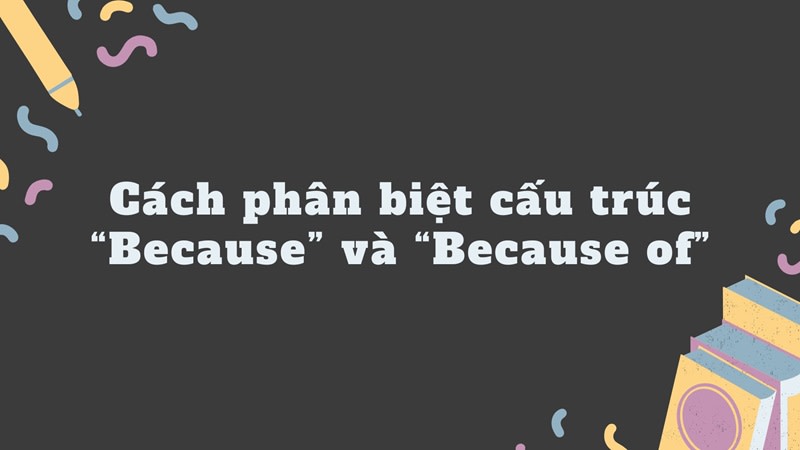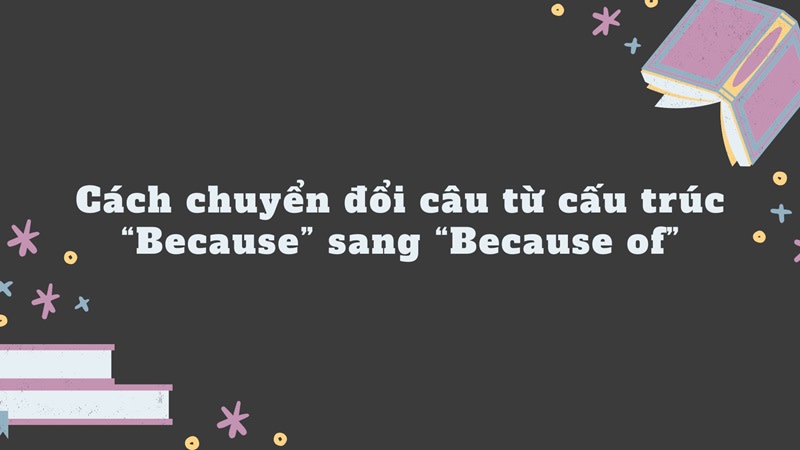Expressing cause and effect is a fundamental yet essential skill in English. Among the most common ways to do this are the structures “because” and “because of”. While both convey the idea of "due to" or "as a result of," their grammatical usage is entirely different. This guide will help you clearly understand how to use “because” and “because of” correctly, especially in the IELTS exam and real-life conversations.
1. What Is “Because”?
“Because” is a subordinating conjunction used to introduce a dependent clause (a reason) that is linked to the main clause (the result). After “because,” a full clause must follow, including a subject and a verb.
Common sentence structures with “because”
Structure 1: Main clause + because + reason clause
I stayed at home because it was raining.
She passed the exam because she studied hard.
Structure 2: Because + reason clause, + main clause
Because he studied diligently, he passed the exam with flying colors.
Because the weather was bad, they cancelled the picnic.
2. What Is “Because of”?
“Because of” is a prepositional phrase that introduces the cause of an action or event mentioned in the main clause. Since it is a preposition, it must be followed by a noun, noun phrase, pronoun, or a gerund (V-ing), not a full clause.
Common sentence structures with “because of”
Structure 1: Because of + noun/noun phrase/V-ing, + main clause
Because of the storm, the flight was delayed.
Because of poverty, he could not study.
Structure 2: Main clause + because of + noun/noun phrase/V-ing
I can't go to the party because of my sickness.
She succeeded because of her hard work.
3. Cách phân biệt cấu trúc “Because” và “Because of”

Criteria | Because | Because of |
Type of word | Subordinating conjunction | Prepositional phrase |
What follows | Full clause (Subject + Verb) | Noun, noun phrase, pronoun, or V-ing |
Usage | Used to connect two clauses and explain cause-effect | Used before a noun or gerund to show reason |
Example | She succeeded because she worked hard | She succeeded because of her hard work |
Quick tip | “Because” → full sentence | “Because of” → noun or gerund |
4. How to Convert from “Because” to “Because of”
When converting a sentence from “because” to “because of”, you need to transform the clause following “because” into a noun phrase, gerund, or pronoun. Here are some common strategies:

When both clauses share the same subject
Change the verb after “because” into its V-ing form.
Because she arrived late, she missed the beginning of the movie. → Because of arriving late, she missed the beginning of the movie.
When the clause after “because” contains a noun
If “because” is followed by a clause like "There is/was + noun", keep only the noun and add it after “because of”.
Because it was bad weather, we stayed home. → Because of the bad weather, we stayed home.
When no noun exists in the “because” clause
Convert adjectives or adverbs into nouns where possible.
Because it is raining, we can’t go outside. → Because of the rain, we can’t go outside.
Use possessive forms or noun equivalents
Convert adjectives into noun forms, using possessives when needed.
Because she was tired, she went to bed early. → Because of her tiredness, she went to bed early.
Using “the fact that”
You can use “because of the fact that” when the original clause is too complex to be shortened easily.
Because the company is expanding rapidly, they need more employees. → Because of the fact that the company is expanding rapidly, they need more employees.
5. Practice Exercises: “Because” vs. “Because of”
Exercise 1: Convert from “Because” to “Because of”
She stayed home because she was sick. → Because of her illness, she stayed home.
I didn’t go to the party because I had too much work. → Because of too much work, I didn’t go to the party.
He failed the exam because he didn’t study. → Because of his lack of study, he failed the exam.
They canceled the trip because it rained heavily. → Because of the heavy rain, they canceled the trip.
We arrived late because the traffic was bad. → Because of the bad traffic, we arrived late.
Exercise 2: Fill in the blank with “because” or “because of”
He was tired because he stayed up late last night.
She got a promotion because of her excellent performance.
The game was canceled because of the heavy rain.
I couldn't concentrate because of the noise.
We decided to go home because it was getting dark.
Because of the strong wind, all flights were delayed.
He is absent today because he has a doctor's appointment.
The concert was a huge success because of the band's popularity.
Because she felt unwell, she left the party early.
They won the championship because of their teamwork.
Exercise 3: Rewrite sentences using “Because of”
Because the weather was extremely cold, we decided to stay indoors. → Because of the extremely cold weather, we decided to stay indoors.
She couldn't finish the report on time because she had too many other tasks. → Because of having too many other tasks, she couldn't finish the report on time.
Because he is a talented artist, his paintings are very popular. → Because of his talent as an artist, his paintings are very popular.
The flight was delayed because there was heavy fog at the airport. → The flight was delayed because of the heavy fog at the airport.
Because they didn't communicate clearly, there were many misunderstandings. → Because of their lack of clear communication, there were many misunderstandings.
We cancelled the outdoor event because it started to rain unexpectedly. → We cancelled the outdoor event because of the unexpected rain.
Mastering “Because” vs. “Because of” in English
Understanding the grammatical and contextual differences between “because” and “because of” is essential for using English accurately and naturally. By practicing and mastering both structures, you can greatly enhance your communication skills in both academic and real-life settings. This will help your sentences become more cohesive, polished, and professional.
If you're planning to take the IELTS test with IDP, you can opt for computer-delivered IELTS with flexible daily test schedules. IDP’s dedicated team will support you from preparation to test day. Plus, with IELTS One Skill Retake, you have the opportunity to retake only one skill (Listening, Speaking, Reading, or Writing) to improve your score without retaking the full test.
Register for your IELTS test with IDP today!
